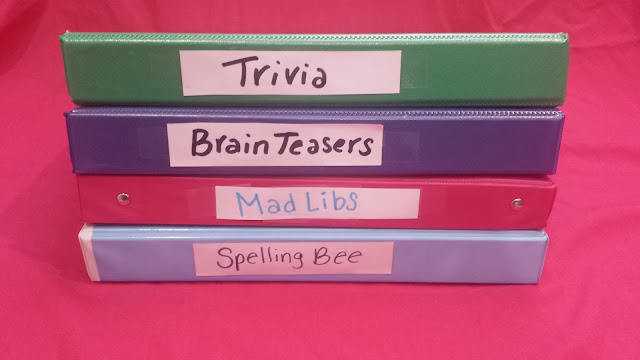6 Early Finisher Activities For Any Subject
On any given day in class, there will inevitably be at least one student who questions you with the iconic, “I’m done. What do I do now?” Instead of panicking because there are 10 minutes left and all other students are still working, you will be prepared with these fun, educational activities.
Trivia
Kids of all ages love being challenged
with trivia questions. Search on the
Internet for trivia aimed at your students’ ages. The trivia can either be an assortment of
random questions or subject-specific questions.
Use key phrases such as “trivia for kids” or “math trivia for middle
school.” Of course, you can also create
your own questions based on course content.
Print several copies of the trivia questions,
as well as one copy of each answer key.
Put all of these sheets in a binder.
Place the answer keys in plastic sheet protectors with a note stating
that answer keys must remain in the back of the binder. Allow students to access the binder at their
leisure, taking out a sheet of trivia questions that they may write on and keep.
Brain Teasers
In addition to answering trivia
questions, kids enjoy solving brain teasers. Plus, critical-thinking skills will be activated. Search online with key phrases such as
“picture brain teasers” or “riddles for kids.”
Just like with the trivia questions,
print several copies of the brain teasers or riddles, along with the answer
keys. Store all of these sheets in a
binder for the students to take out pages as needed during free time.
Mad Libs
Reviewing the parts of speech of the
English language should not be reserved solely for reading and writing classes. Any opportunity to strengthen your students’
command of the English language should be embraced, and Mad Libs is a great,
entertaining, creative way to do that.
Printable versions of the timeless game
can be found on the Internet, so printed copies can be put into a binder. It is also helpful to include reference
sheets with definitions of the parts of speech.
Another option is to buy several Mad Libs books to keep in a bin or on a
book shelf. The books can be found at
most book retailers and stores that sell children’s games and toys.
Writing Prompts
As with Mad Libs, writing prompts should
be used in all subjects. Activities to
enhance writing abilities benefit your students’ academic growth. One option for the storage of writing prompts
is to have each prompt on a separate strip of paper in a container in which the
strips will be randomly selected.
Another option is to have a list of prompts on several sheets of paper,
and put each sheet in a plastic sheet protector within a binder for students to
peruse and select prompts of interest.
The writing prompts can relate to your
content in order to be reflections of the knowledge students have gained. A prompt in a social studies class might
read, “Explain how life today would be different if the Declaration of
Independence was not created.” In a
science class, a prompt may state, “Select a scientist. Describe the impact that his/her discoveries
have had on society.” By composing
responses, students are activating prior knowledge to defend a claim of their
choosing and are utilizing cross-curricular skills.
Literary Resources
A variety of digital platforms exist
that provide an abundance of fiction and nonfiction texts related to all
academic disciplines. Resources such as
Scholastic, NewsELA, CommonLit, and ReadWorks provide such materials. The texts on these websites include
accompanying questions in the forms of multiple choice and short-answer to
enhance a variety of skills: reading comprehension, critical-thinking,
inferencing, defining new terms, and more.
Print an assortment of texts and their
questions to keep in a binder. Students
can select readings of interest to them, which will keep them productive and
engaged while their classmates continue working on the day’s activity.
Independent Reading
Request that your students bring
independent reading books to class every day.
The books can be of any genre, as long as they are school appropriate,
of course. Encourage students to explore
anything from a biography about a musician to a graphic novel about an
action-packed adventure.
When students have books that are
self-selected, they will look forward to days where they have a few minutes
left at the end of class to read.
Enhancing reading ability and vocabulary will positively impact
students’ academic skills across all subjects.
Regarding the first five enrichment
activities, keep a folder for each student where he/she can store their assignments
– trivia, writing prompts, etc. – that are in progress or have been completed. As the end of the marking period approaches,
you can review their work and grant extra credit. Additionally, each student can look back at
his/her folder throughout the year and be proud of the effort put into the
extra activities.
What enrichment activities do you
recommend for early finishers? Leave a
question, comment, or suggestion below, in the Comments Section!
Please visit my Teachers Pay Teachers store to purchase a variety of resources for all grades and subjects!
Follow me on Instagram:
elathemissmway
Peace. Love.
Reading & Writing.
💗 Miss M





Comments
Post a Comment